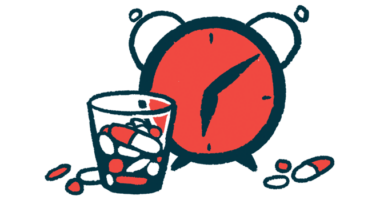Therapies to Improve Mental Health Needed in HAE Management

dizain/Shutterstock
Effective management of hereditary angioedema (HAE) should include addressing psychological and mental health, given that depression, stress, and anxiety are “prevalent” among patients and can place a considerable burden on those with the chronic genetic disease, a study reported.
Indeed, according to researchers, “all participants [in this study] experienced poor overall [health-related quality of life],” with 76% of patients found to have stress and anxiety. More than 70% were found to experience depression.
“Study findings suggest that physicians treating patients with HAE should routinely inquire about mental health and psychosocial well-being and refer patients to specialist care as appropriate,” the investigators wrote.
The study, “Psychosocial burden of type 1 and 2 hereditary angioedema: a single-center Canadian cohort study,” was published in the journal Allergy, Asthma & Clinical Immunology.
The unpredictable and potentially life-threatening swelling attacks associated with HAE, along with an often-delayed diagnosis — which leads to unneeded medical procedures and ineffective treatment — contribute to a continuous sense of psychological distress among those living with the disorder, the researchers said. Additionally, despite advances in treatment, HAE lacks a cure.
The symptoms of HAE have been shown to impact patients’ abilities to perform daily activities and maintain normal social interactions across diverse settings. Yet, understanding and managing this psychosocial burden remains a largely unmet medical need.
To address this, researchers from the University of Calgary, in Canada, conducted a survey to better understand how HAE impacted respondents’ quality of life and work productivity.
The survey included several psychological, quality-of-life, and work productivity questionnaires. Participants’ demographic and clinical data also were collected.
A total of 17 individuals with HAE type 1 or 2, ages 19 and older, participated in the study. From these, 11 (64.7%) reported using preventive, or prophylactic treatments, while six (35.3%) used on-demand treatments. However, according to researchers, “there was no significant difference in depression, anxiety, or stress scores between participants on prophylaxis versus on-demand treatment.”
Moreover, all participants reported experiencing psychological symptoms to varying degrees.
Depression, anxiety, and stress were particularly prevalent, with 47–76% of respondents reporting any of these symptoms and 18–24% having severe symptoms of at least one of those conditions.
The other most frequently reported symptoms included mania, anger concerning HAE, sleep disturbances, and somatic symptoms — pain, weakness, or shortness of breath — which were reported by 58.8–82.4% of patients.
Impaired personality functioning, generally defined as not knowing who one is, what they want out of life, or not feeling close to others or enjoying relationships, was reported by 52.9% of the respondents.
The scientists noted that the use of preventive treatments is more common among people with severe HAE. However, the team said, it “is difficult to disentangle the participant’s current medical condition from past experience with respect to psychosocial burden.”
“The apparent lack of correlation between prophylaxis use and psychosocial scores also highlights the need for psychosocial intervention, as medical treatment alone may not improve an individual’s psychosocial health,” they wrote.
All participants described an overall poor quality of life related to HAE, with frequent feelings of fatigue and fear. Female respondents reported significantly greater HAE-related fear and stress than did their male counterparts.
Nearly two-thirds of respondents (64.7%) were employed and only one reported health-related absenteeism at work, resulting in a work productivity loss of 27%.
Finally, 64.7% of respondents reported impairments in daily activities due to health problems, resulting in a mean activity impairment of 20.6%.
According to the investigators, these findings should be the basis for additional research into the “context of HAE burden” and the disease’s effects on patients’ overall health and quality of life.
“More immediately, they suggest that physicians treating patients with HAE should routinely inquire about mental health and refer patients to specialists when needed,” the team wrote.
“Providing holistic care to patients with HAE, including managing symptoms reported by patients such as depressive and anxiety symptoms, stress and sleep disturbances, may be important for improving outcomes,” they concluded.







